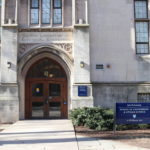
Tisa Wenger, Isabela Mares, Marisa Bass, Robyn Creswell (Courtesy of Wenger, Mares, Bass and Annette Hornischer)
Four Yale faculty members recently received Guggenheim Fellowships, prestigious grants awarded to those who have “demonstrated exceptional capacity for productive scholarship or exceptional creative ability in the arts.”
Three of the four — Robyn Creswell, Marisa Bass and Isabela Mares — hail from the Faculty of Arts and Sciences, while the fourth — Tisa Wenger — is an associate professor at the Yale Divinity School. All four of the Yale recipients intend to use the fellowship, which takes the form of grants made for anywhere between six and 12 months, to help them complete books that are currently in the works.
“Each of the scholars who has been honored with the Guggenheim award is broad-ranging, imaginative, and field-shaping in their work,” Tamar Gendler, dean of the FAS, wrote to the News in an email. “We are fortunate to have them as colleagues, and our students are fortunate to have them as teachers.”
Because the fellowship provides fellows with condition-free grants, the aim is to allow for as much “creative freedom as possible,” as well as to give recipients blocks of time during which to focus solely upon their projects, according to the fellowship’s website. Although the amount per grant varies depending on the plans and resources of each fellow, the website adds that the Guggenheim Foundation “strives to allocate its funds as equitably as possible.”
Bass, associate professor of art history, received doubly exciting news — not only is she a Guggenheim Fellow, but she is also the inaugural Guggenheim Fellow in Early Modern Studies.
Bass plans to use the Fellowship to aid in the completion of her current book, entitled “The Monument’s End: Public Art and the Modern Republic.” She added in an email that she was both “inspired and emboldened to expand in scope” the book by teaching Yale undergraduates in the introductory course “The Politics of Representation.”
“It is such a privilege to teach students willing to question established historical narratives and to explore a plural history of art, and who challenge me to be a better scholar,” Bass added.
For Isabela Mares, Arnold Wolfers professor of political science, the award will similarly allow her to focus on completing a book about how first-wave democracies — such as France, Germany, Belgium and Britain — have adopted electoral reforms, as she can use the funds to “return full time to research and writing.”
Tisa Wenger, associate professor of American religious history, told the News that receiving the fellowship was a “huge honor.”
Wenger is currently working on her third book, “How Settler Colonialism Made American Religion,” and, like Mares, plans to use the fellowship to work on writing the book full time. She hopes that the book will “challenge” religious studies scholars to take “the histories of settler colonialism and U.S. Empire” seriously as a foundation for their scholarship.
Wenger added that when in-person interaction is once again safe, she hopes to meet the other fellows.
“At various moments in my career, serendipitous encounters and conversations with creative thinkers across fields has helped me think about my work in new and generative ways,” Wenger wrote in an email to the News. “Whether or not this fellowship leads to such serendipitous encounters, I know that the time it provides and the connections that it facilitates will help me think more broadly about my work and so ultimately to write a better book.”
Robyn Creswell, associate professor of comparative literature, called receiving the fellowship “a big bright spot in what has obviously been a grim year” and a “powerful affirmation” that his work is worthwhile.
Like the others, Creswell is planning to use the fellowship to complete his book, which describes the intellectual history of the modern Arab world through the lens of poets and poetry.
He is similarly looking forward to being able to fully devote himself to his work.
“The Fellowship gives one extra time to think and write,” Creswell wrote in an email to the News. “What could be more valuable than that?”
This year, the Guggenheim Foundation received approximately 3,000 applications, and 184 fellowships were ultimately awarded.
Madison Hahamy | madison.hahamy@yale.edu
Correction, April 13: A previous version of this article misspelled Isabela Mares’ first name. The story has been updated to correct that, as well as add additional detail about Mares’ book.










